Is an OP main character not feasible?
Spoilers for Mulan (2020)
Estimated reading time: 13 minutes
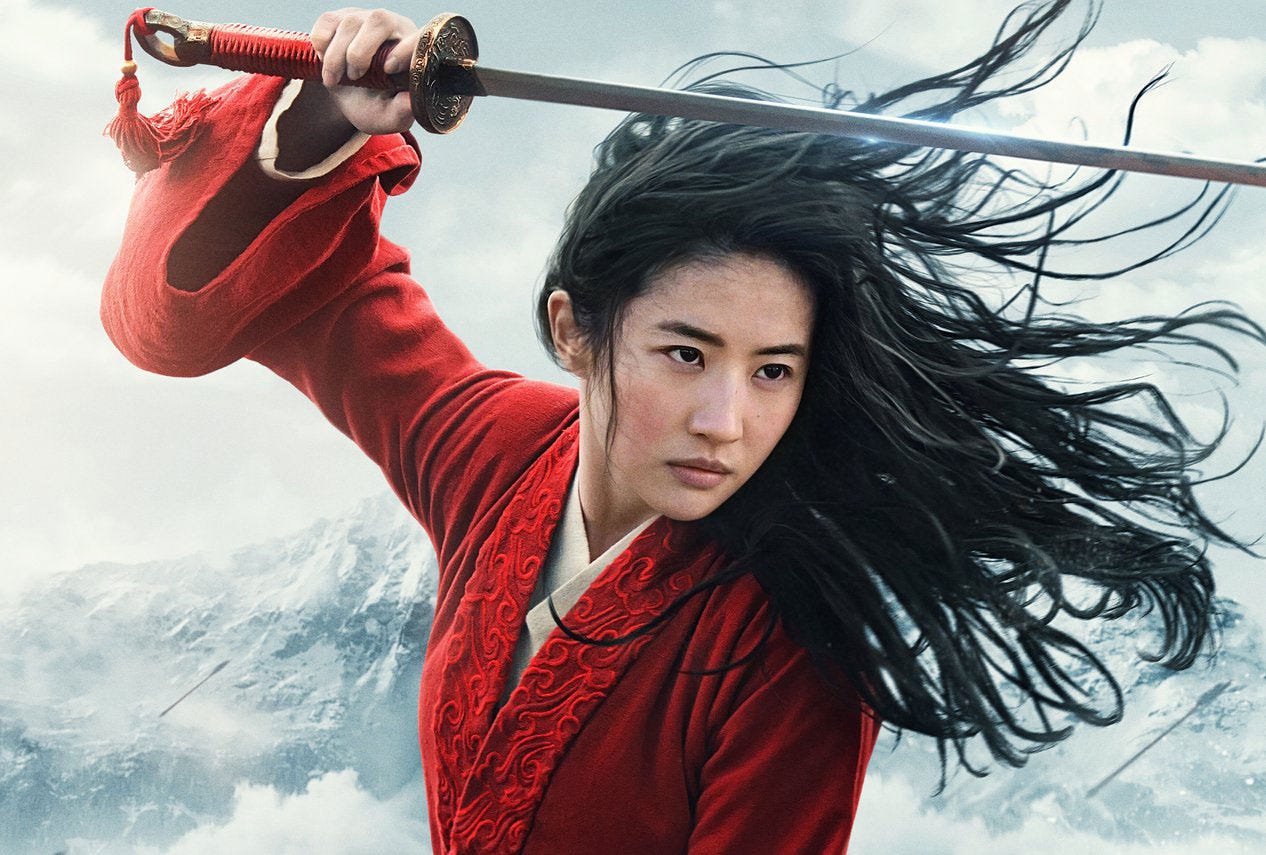
Critics have pointed out that—in the cinematic universe, at least—Superman, Captain Marvel, and Rey (from Star Wars) don’t really make interesting hero stories. Mulan, in the 2020 live-action adaptation, is the latest character to join that list. All of them start out more powerful than the rest—and only become more so—with no apparent weakness that results in growth or increases the stakes for a dramatic and satisfying resolution.
Mulan (2020) has received criticism for its messaging (that it’s not empowering to all women), cultural depiction (that it’s a westerner’s view of Chinese culture), and story (why ditch the ballad’s narrative and theme—that men and women are equal and can achieve great things by working together—when it has made Mulan legendary?). The last bit suggests that there’s nothing compelling about 2020 Mulan because she’s OP or a Mary Sue; that’s led me to wonder: Can you not have an OP main character and have a riveting or meaningful story?
A rule of thumb in storytelling is that the main character must grow in the course of his journey. For that to happen, he must overcome obstacles as he strives to achieve his goal. And there must be challenges because conflict is what sparks a story. Without conflict, you just have a sketch.
Judging from appearances alone, an OP main character doesn’t really follow the said template in the same way the usual hero-to-be does. As a clear, standard example of the latter, Hercules in the animated Disney movie is introduced as this scrawny, clumsy guy; and we expect him, through rigorous training, to become physically stronger and more confident. His hard-earned strength and bravery are then tested by the different beasts he must defeat; his heroism, by the number of people he saves (or so he thinks).
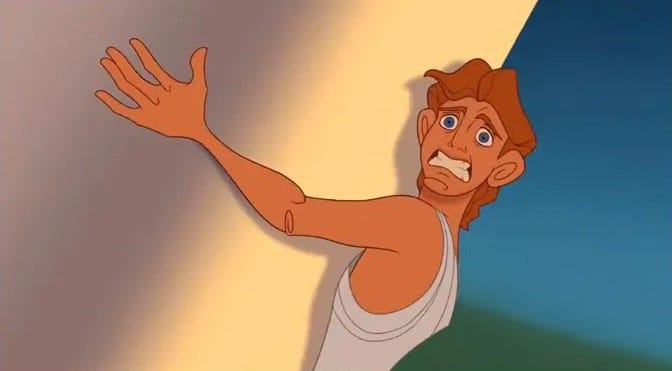
Image/Hercules (1997). A clumsy Hercules must become a true hero to be reunited with his father Zeus.
Because 2020 Mulan is OP, her journey is about becoming true to herself and no longer being held back by society. On its own, it’s an important and empowering message. But it leaves a lot to be desired; the question remains: Why must a person be true to herself? What’s the cost of being untrue?
The filmmakers were onto something with Xian Lang, the shapeshifter played by Gong Li, who tells Mulan, “Your deceit weakens you.” Unfortunately, this weakness isn’t explored beyond Mulan struggling to retrieve her sword, which flung away, and being struck by Xian Lang’s blade just seconds later—all physical manifestations of weakness.
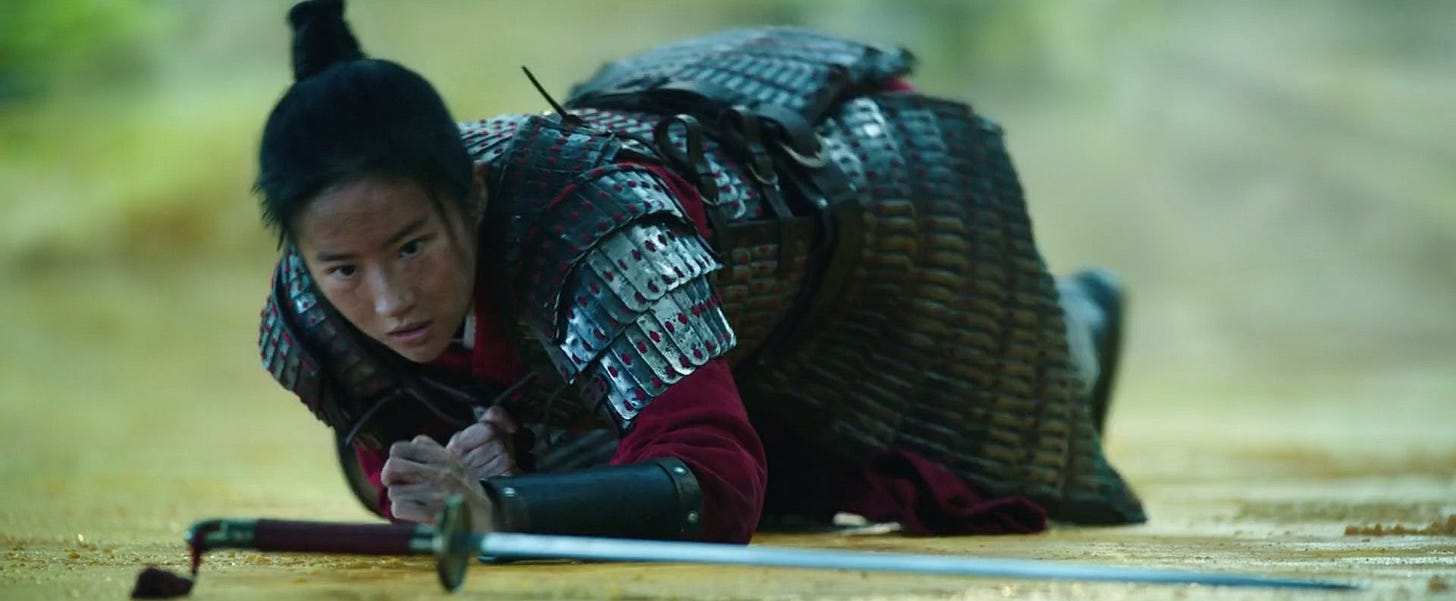
Image/Mulan (2020). Mulan crawls to retrieve her sword to fight Xian Lang.
This isn’t to say that showing physical weakness shouldn’t have been done. On the contrary, the filmmakers were right to do it. It’s just lacking. Being untrue to oneself could’ve led to being unable to speak up for oneself first, then not being strong enough to handle the circumstances that have sprung from the lie. The key is failure (or mistakes)—which isn’t the case for 2020 Mulan, who, before meeting Xian Lang, excels (and is better than everyone else) at training camp. She fares well in battle too, for being the only one in her team to return fire against the Rourans during a horse chase.
I’m not a fan of how the live-action incorporated chi, but to illustrate my point further: In their confrontation, Xian Lang reiterates to Mulan, “[Your deceit] poisons your chi.” Sadly, we don’t see that poison, that inner struggle, that self-destructiveness—the thing that’s at stake for being untrue to oneself—manifest in Mulan.
Any good story is underpinned by the character’s inner self. The change of perspective or heart is proof of character change. Disney’s Hercules doesn’t forget this inner journey; Zeus doesn’t admit Hercules to Mount Olympus after he’s defeated all the monsters around, because Hercules isn’t a true hero yet despite his physical strength, kill count, and fame.
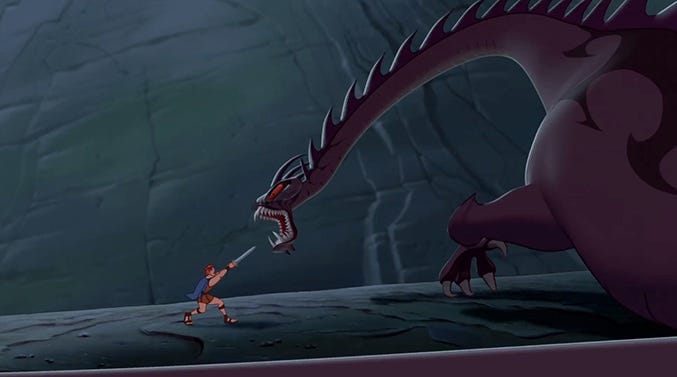
Image/Hercules (1997). Hercules vs Hydra: The battle Hercules thought would reunite him with Zeus at Mt. Olympus.
Yet through more challenges later on, Hercules learns to put others before himself and make sacrifices. Before he even realizes it, his actions and change of character have made him divine.
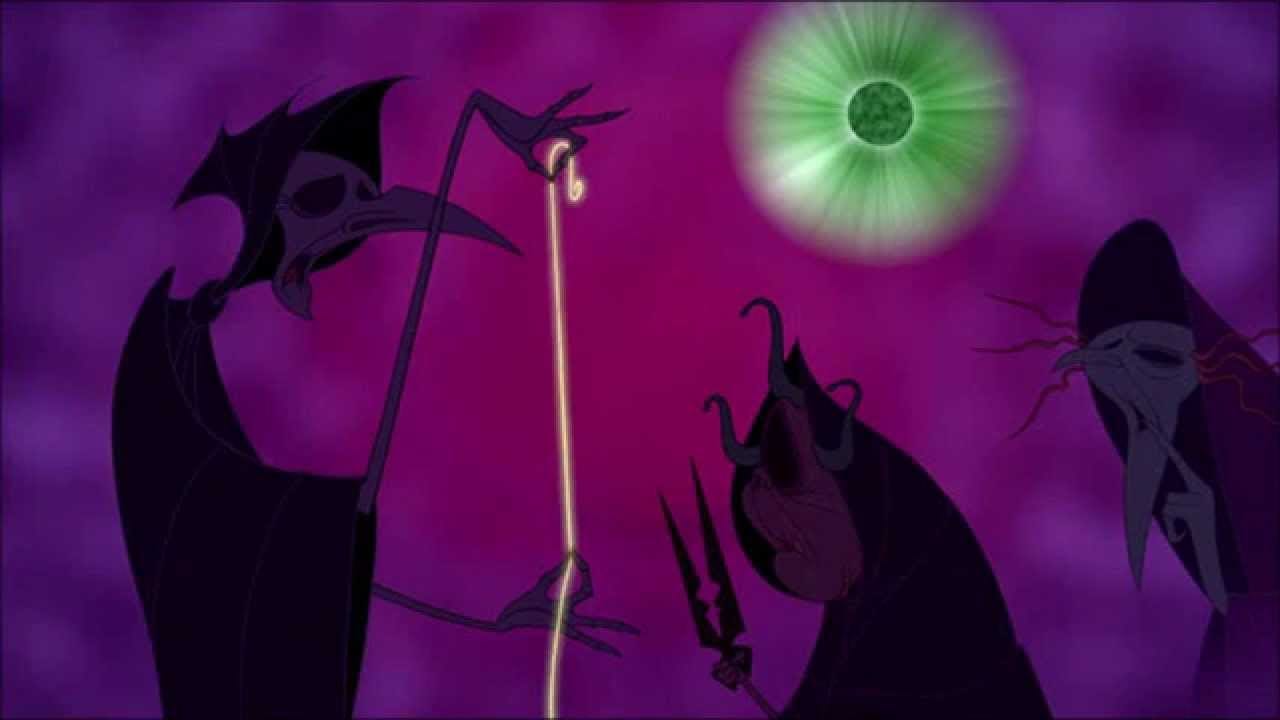
Image/Hercules (1997). Hercules’ “lifeline” becomes gold and unbreakable, symbolizing divinity, after his self-sacrifice to bring his beloved, Meg, back to life.
This is what the live-action Mulan has failed to do. By no means did 2020 Mulan transcend her old self. She may have become physically stronger and begun to live out the full potential of her physical abilities. But she doesn’t stand up for herself; saying “I am Hua Mulan” doesn’t count. When she’s questioned and doubted by her commanding officer after her big reveal, she doesn’t defend herself with, “You trust Hua Jun. What makes Mulan any different?” (The animated Mulan says that, FYI!) In the live-action, Mulan’s fellow soldier Honghui utters that powerful line for her.
And in the final battle, when Mulan loses her sword from a duel with the Rouran leader Bori Khan, she only continues to fight after the Emperor tells her to. Yes, it’s valid for her to be crushed by the loss of something valuable to her father (and therefore valuable to her). But she doesn’t overcome the loss from within herself. As much as she fights well, she can’t light her own fire.
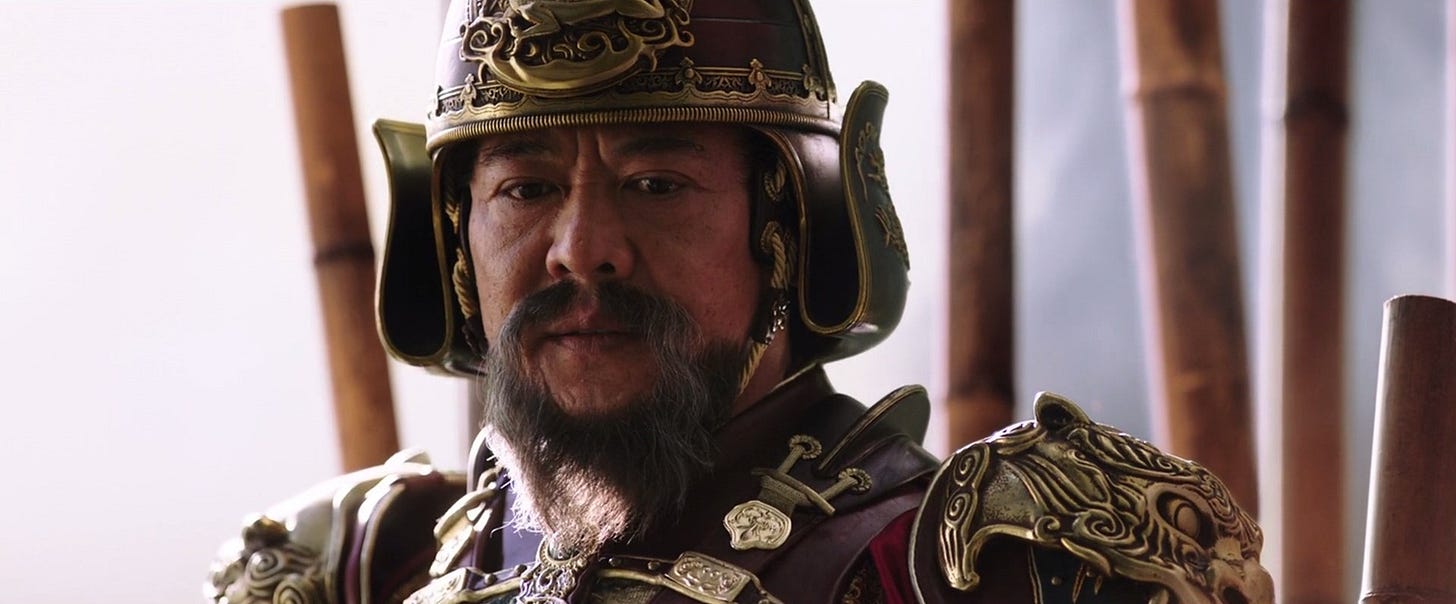
Image/Mulan (2020). The Emperor tells Mulan, “Rise up. You are a mighty warrior. Rise up like a phoenix. Fight for the kingdom and its people.”
Within the film’s logic, it would’ve made more sense for Mulan to start out as a martial arts prodigy before joining the army, be progressively weakened by her lie to everyone, experience failure, then grow physically and emotionally after the confrontation with Xian Lang. But this is so far from the original tale that it would make more sense to have a new film and premise entirely—maybe that should’ve been the case for a more meaningful story.
OP characters done right
The TV show Avatar: The Last Airbender has an OP main character: Aang, a peaceful, fun-loving child and monk, who is a reincarnation of a “messianic figure” called the Avatar. But it doesn’t suffer from the Mary Sue problem. Aang, powerful as he is, is forced by his journey to overcome or improve something about himself.
The same can be said about the young earthbending master Toph Beifong. Although she’s a supporting character, she’s undoubtedly OP, and her journey also involves change, growth.
Aang’s emotional journey is heavy. First, he deals with the guilt of having abandoned his Avatar training at the air temples, since his people were killed and wiped out in his absence. He must forgive himself and accept the past if he’s to move forward and step up to his responsibilities as the Avatar. Otherwise, he would just run, hide, and cower as he’d done before, and possibly drown in a dangerous cycle composed of feelings of inadequacy, fear, guilt, shame, and anger.
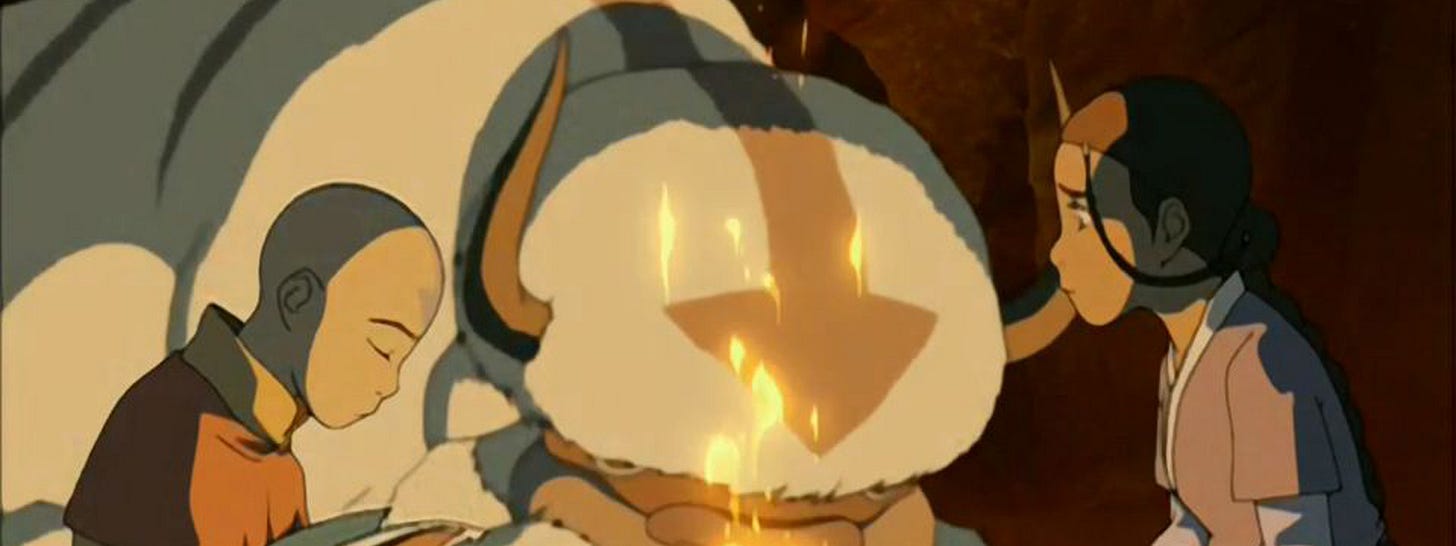
Image/Avatar the Last Airbender. After being criticized for abandoning the world, Aang retreats to a cave in shame. He later recounts his past, where he felt lost, confused, and angry about being the Avatar.
Second, after he’s reconciled with himself, he later realizes he has to go against what he believes in and loves—to kill a person, Fire Lord Ozai—to restore peace. Avatar Yangchen puts this inner conflict well in her advice to Aang before his final battle: “Selfless duty calls you to sacrifice your own spiritual needs and do whatever it takes to protect the world.”
In the final showdown, Aang faces Fire Lord Ozai without fear. He’s not only learned to bend the four elements sans Avatar State (physical journey), but with his first inner struggle resolved, he’s also free of guilt or self-doubt and resentment or vengeance. He’s fully committed to peace.
Yet how that peace will come about, if it will, is still a question up until the final battle (for suspense and drama, of course). This inner narrative plays out with the physical narrative that involves the fight: Has Aang truly mastered the elements to defeat the Fire Lord, at the expense of who he is and the person he wants to be? Or will he be defeated for showing mercy, thus letting the war continue? With this dilemma, the only things Aang holds on to are his goal (defeat the Fire Lord without killing him) and the wisdom of the Lion Turtle, whom he met after confronting previous Avatars: “The true mind can weather all lies and illusions without being lost. The true heart can tough the poison of hatred without being harmed.”
Aang defeats Fire Lord Ozai by taking away the latter’s firebending—something he realized he could do after deflecting his last blow to Ozai. You can say that Aang is lucky that energybending is possible and therefore didn’t have to compromise at the end. But energybending isn’t the easy way out either; it’s risky. “Your own spirit must be unbendable, or you will be corrupted and destroyed,” the Lion Turtle has warned Aang.
If anything, Aang’s successful energybending is proof of his inner strength—which could’ve still been debatable if the choice were just between killing and not killing Ozai (e.g., some fans think Aang should’ve killed the sandbender that took and sold Appa). With energybending, it’s clear that Aang is incorruptible because he’s able to overcome the Avatar State and its influence on him, and because he wasn’t destroyed by energybending itself. And that’s thanks to all the things he’s learned and done throughout his journey, including the value of forgiving himself and others, as well as showing mercy.
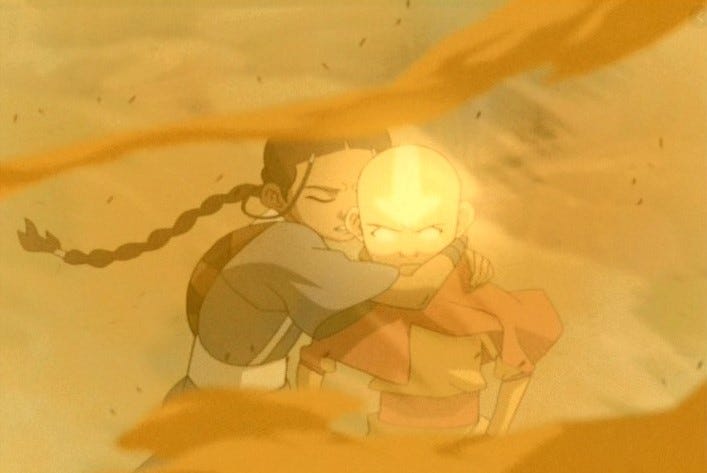
Image/Avatar the Last Airbender: Katara teaches Aang to let go of his anger after losing Appa.
Meanwhile, Toph Beifong is interesting; she’s OP precisely because of her disability. Her blindness has made her family overprotective of her, which is why she strives for independence and refuses affection or help. But even Toph learns some things too: to work in a team and to accept love and care from other people. She needed the former to live out her strong, independent self with purpose and away from her parents, and the latter to finally have a group of people who accept her for who she is and genuinely understand her—lifelong friends close enough to be family—something she didn’t have before but always wanted.
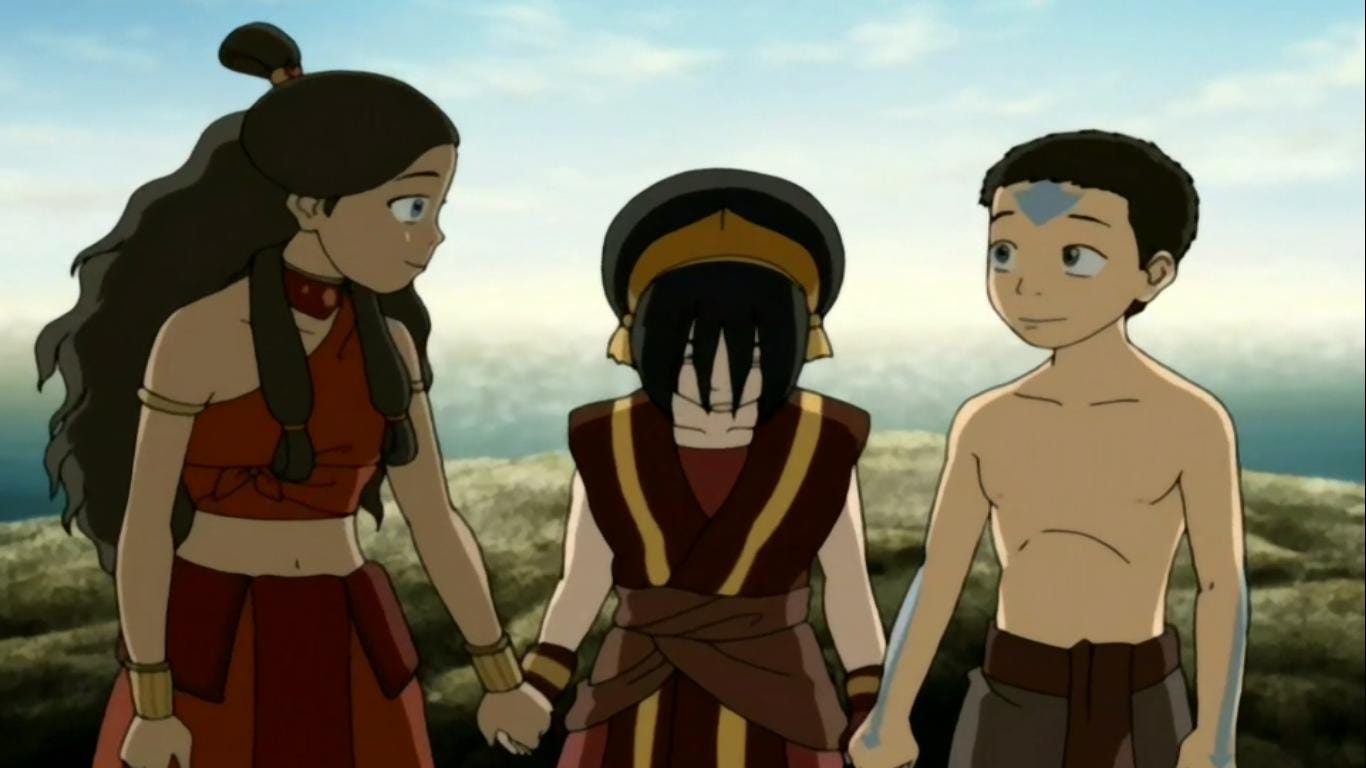
Image/Avatar the Last Airbender. Toph asks, “Do you really think friendships can last more than one lifetime?”
Crafting an OP main character: final words
If you have an OP character in your story, consider the challenges he or she will face for being superior to everyone else. These are likely to involve relationships with the self or others—hubris and/or alienation. Ask yourself: How can these be brought out and explored alongside the physical journey?
The inner journey is what brings out the humanity—the vulnerability—of an OP character. It might sound paradoxical, but it’s what brings the character closer to reality, thus creating a more believable, honest story. And don’t the best stories do that?
